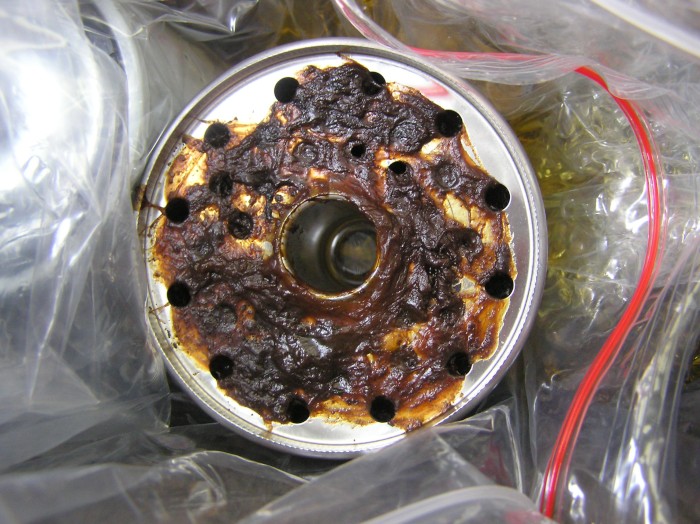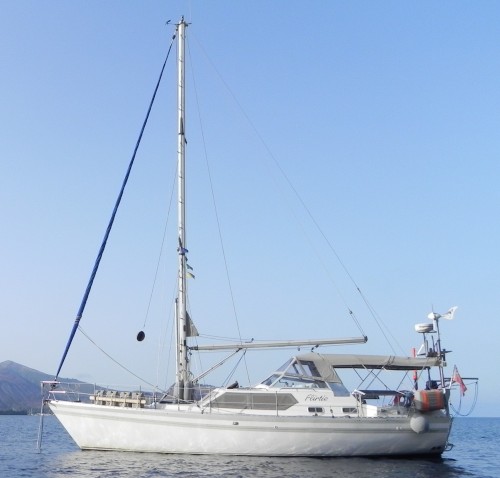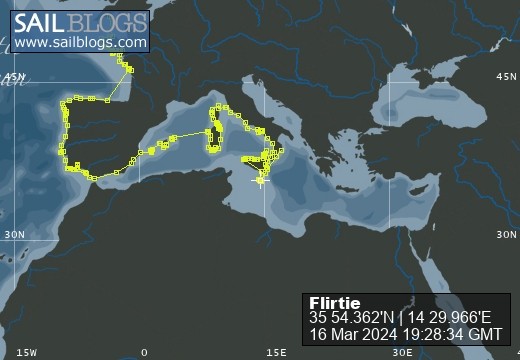is this the dreaded 'diesel bug'?

We believe so.
When it comes to buying diesel for Flirtie we are fastidious! We always keep the tanks topped up so as to reduce the likelihood of condensation forming in the tank. If we have a choice of buying fuel at a marina or from a local garage we generally prefer to use the local garage on the basis that the turnaround is greater and typically cheaper. As a protective measure we also add an additive to our fuel, namely 'Fuel Set' which has served us well over the years...until now!
Strangely, we've had no indication whatsoever to suggest that 'the bug' has been slowly developing in our tanks. The CAV filter bowls have remained clean without any signs of water and the engines have started first time and have been running smoothly and cleanly. We had even considered not changing our fuel filters this year because the glass bowls looked so clean but now we're very pleased we did. All we can say is have you checked your fuel filter recently?
From research it appears that biodiesel (recycled oil from vegetable, rape seed etc) is slowly being
added into our diesel for environmental reasons. The knock-on effect however is that it can block fuel pipes, filters, pumps and injectors and stop engines from working. In a car, this would be inconvenient to say the least but in a yacht or motorboat this could be life threatening depending on the situation you find yourself in.
Without doubt biodiesel is here to stay and with it the risk of getting the 'diesel bug' is significantly increased especially when large quantities of diesel remain unused for months on end.
Speaking with other cruisers here in Portimao, many have faced the same problem and have dealt with it in a number of ways:-
- Some have disposed of their fuel completely, removed their tank(s) and had them professionally cleaned
- Some have transferred their fuel (filtered) to temporary storage tanks and cleaned their tanks by hand
- Some have enlisted the help of professionals who vacuum/filter the fuel
- Some have used chemicals to kill the bug
...all very costly and in our opinion with the content of biodiesel set to increase, the risk of it happening again very likely. What we needed was a solution for our existing contamination but also something that would be cost effective in the longer term.
We decided to fashion our own method of cleaning the tanks using a spare filter and fuel pump and a couple of transparent hoses (so we could see the damage) for the input and return. Thankfully we had relatively easy access to each tank by removing the fuel sender. It was then a matter of patiently 'hoovering' as much of the tank as possible. Unfortunately we couldn't cover the whole tank as a couple of baffles prevented access.

Our patience paid off when we could clearly see both fibrous and goopy muck being drawn up to the filter and clean fuel returned. On more than one occasion we even blocked our 8mm suction hose in the process. With both tanks now relatively clean we followed with a biocide treatment. We found a Practical Boat Owner article where they did a review of the latest diesel treatments in the marketplace http://www.marine16.co.uk/acatalog/diesel_bug_pbo_test1.pdf. 'Marine 16' stood out from the rest and as luck would have it we could obtain it here in Portugal.

The treatment "Marine 16 Treatment" and ongoing prevention "Marine 16 Complete" cost over €100 - we hope money well spent compared to disposing of 500 litres of fuel. We decided to follow the instructions assuming we had "severe contamination" and 'shocked' our fuel with 100ml of "Treatment" for 100 litres of fuel and waited the recommended 72 hours. Then being curious people we decided to 'hoover' the tanks one more time. Immediately it was obvious that this chemical really breaks down the deposits into what we can only described as 'granules' which can easily pass through the pipes to the fuel filter instead of causing blockages. Fingers crossed, we're now hopeful that this product has eliminated the bug and that from here on we just need to treat new fuel with the appropriate amount of "Complete" - only time will tell. Needless to say we'll be carrying quite a few spare fuel filters just in case ;-)
In an ideal world we should be on the lookout out for fuel which is FAME-free or contains a very low percentage of biodiesel but unfortunately this is becoming increasingly difficult. Interestingly, for those cruisers travelling around Spain and Portugal, GALP, the largest supplier of fuel in Spain and Portugal has recommended that biocide additives should be added to fuel over 3 months old in all marine environments. On the positive side, the RNLI uses Marine 16. (source: http://www.marine16.co.uk/ )
When it comes to buying diesel for Flirtie we are fastidious! We always keep the tanks topped up so as to reduce the likelihood of condensation forming in the tank. If we have a choice of buying fuel at a marina or from a local garage we generally prefer to use the local garage on the basis that the turnaround is greater and typically cheaper. As a protective measure we also add an additive to our fuel, namely 'Fuel Set' which has served us well over the years...until now!
Strangely, we've had no indication whatsoever to suggest that 'the bug' has been slowly developing in our tanks. The CAV filter bowls have remained clean without any signs of water and the engines have started first time and have been running smoothly and cleanly. We had even considered not changing our fuel filters this year because the glass bowls looked so clean but now we're very pleased we did. All we can say is have you checked your fuel filter recently?
From research it appears that biodiesel (recycled oil from vegetable, rape seed etc) is slowly being
added into our diesel for environmental reasons. The knock-on effect however is that it can block fuel pipes, filters, pumps and injectors and stop engines from working. In a car, this would be inconvenient to say the least but in a yacht or motorboat this could be life threatening depending on the situation you find yourself in.
Without doubt biodiesel is here to stay and with it the risk of getting the 'diesel bug' is significantly increased especially when large quantities of diesel remain unused for months on end.
Speaking with other cruisers here in Portimao, many have faced the same problem and have dealt with it in a number of ways:-
- Some have disposed of their fuel completely, removed their tank(s) and had them professionally cleaned
- Some have transferred their fuel (filtered) to temporary storage tanks and cleaned their tanks by hand
- Some have enlisted the help of professionals who vacuum/filter the fuel
- Some have used chemicals to kill the bug
...all very costly and in our opinion with the content of biodiesel set to increase, the risk of it happening again very likely. What we needed was a solution for our existing contamination but also something that would be cost effective in the longer term.
We decided to fashion our own method of cleaning the tanks using a spare filter and fuel pump and a couple of transparent hoses (so we could see the damage) for the input and return. Thankfully we had relatively easy access to each tank by removing the fuel sender. It was then a matter of patiently 'hoovering' as much of the tank as possible. Unfortunately we couldn't cover the whole tank as a couple of baffles prevented access.

Our patience paid off when we could clearly see both fibrous and goopy muck being drawn up to the filter and clean fuel returned. On more than one occasion we even blocked our 8mm suction hose in the process. With both tanks now relatively clean we followed with a biocide treatment. We found a Practical Boat Owner article where they did a review of the latest diesel treatments in the marketplace http://www.marine16.co.uk/acatalog/diesel_bug_pbo_test1.pdf. 'Marine 16' stood out from the rest and as luck would have it we could obtain it here in Portugal.

The treatment "Marine 16 Treatment" and ongoing prevention "Marine 16 Complete" cost over €100 - we hope money well spent compared to disposing of 500 litres of fuel. We decided to follow the instructions assuming we had "severe contamination" and 'shocked' our fuel with 100ml of "Treatment" for 100 litres of fuel and waited the recommended 72 hours. Then being curious people we decided to 'hoover' the tanks one more time. Immediately it was obvious that this chemical really breaks down the deposits into what we can only described as 'granules' which can easily pass through the pipes to the fuel filter instead of causing blockages. Fingers crossed, we're now hopeful that this product has eliminated the bug and that from here on we just need to treat new fuel with the appropriate amount of "Complete" - only time will tell. Needless to say we'll be carrying quite a few spare fuel filters just in case ;-)
In an ideal world we should be on the lookout out for fuel which is FAME-free or contains a very low percentage of biodiesel but unfortunately this is becoming increasingly difficult. Interestingly, for those cruisers travelling around Spain and Portugal, GALP, the largest supplier of fuel in Spain and Portugal has recommended that biocide additives should be added to fuel over 3 months old in all marine environments. On the positive side, the RNLI uses Marine 16. (source: http://www.marine16.co.uk/ )




Comments